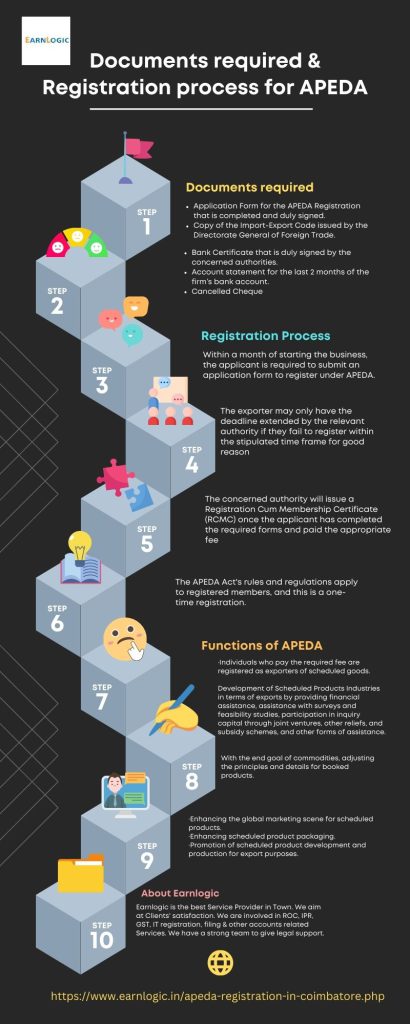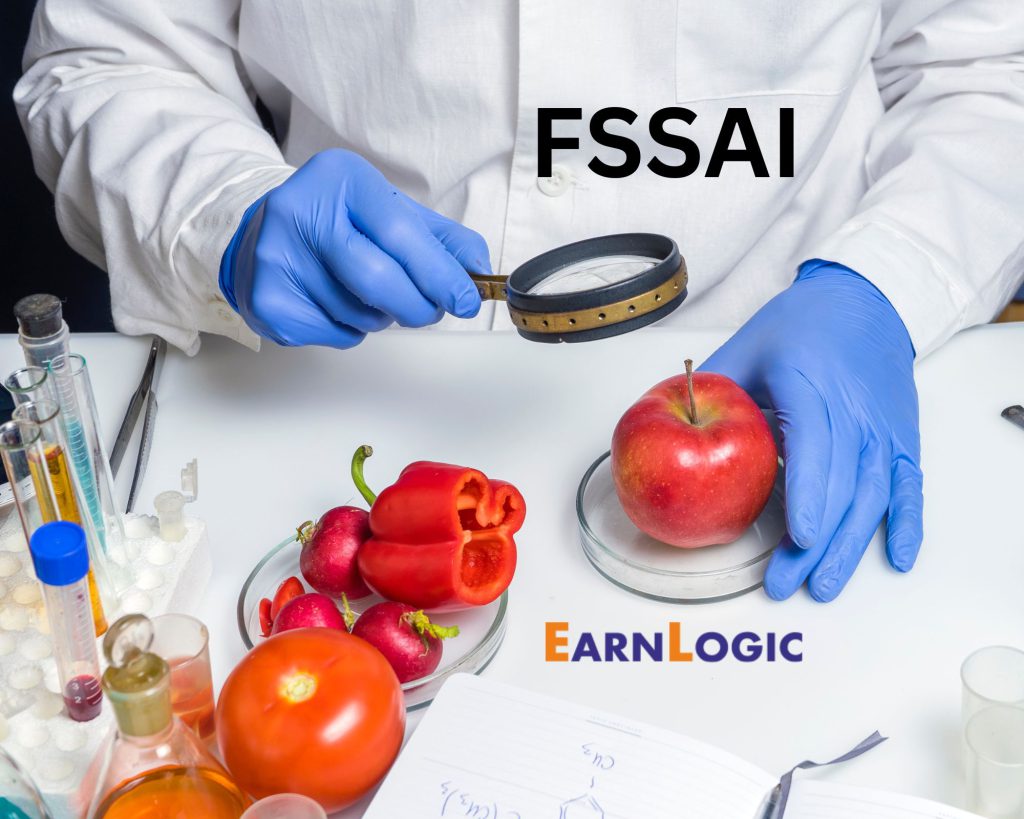The Agricultural and Processed Food Products Export Development Authority, or APEDA for short, was established in 1985 following the provisions of the Agricultural and Processed Food Products Export Development Authority Act of 1985, which had the goal of developing and promoting the export of scheduled products. It was established to provide guidelines, information, and financial support for scheduled product development. The aforementioned Act includes a list of these scheduled products, and exporters of these products are required to register with the APEDA.
Aim of APEDA
The Agricultural and Processed Food Products Export Development Authority/APEDA intends to advance the commodity of scheduled products according to the APEDA Act and the Central Government.
Under the guidelines of the Central Government, various tasks are carried out to achieve this. Through the APEDA that has APEDA registration in Coimbatore, the Central Government oversees the rules and regulations as well as their implementation for effective administration.
Functions of APEDA
The following responsibilities have been assigned to the APEDA which has APEDA registration in Coimbatore:
- Individuals who pay the required fee have the registration as exporters of scheduled goods.
- Development of Scheduled Products Industries in terms of exports by providing financial assistance, assistance with surveys and feasibility studies, participation in inquiry capital through joint ventures, other reliefs, subsidy schemes, and other forms of assistance.
- With the end goal of commodities, adjusting the principles and details for booked products.
- Leading examinations on meat and meat products in spots, for example, slaughterhouses, safety plants, capacity premises, and transports, including different spots where such products are kept/dealt with to guarantee the norm and nature of the said products.
- Enhancing the global marketing scene for scheduled products that have APEDA registration in Coimbatore.
- Enhancing scheduled product packaging.
- Promotion of scheduled product development and production for export purposes.
- Training in a variety of aspects of the industry that are linked to scheduled products.
- Statistics on the production, processing, packaging, marketing, and export of scheduled goods are collected that have APEDA registration in Coimbatore.
- Owners of factories or other establishments, as well as any other specified individual, would be the sources of this information regarding scheduled products. They could also be gotten from excerpts and publications.
Advantages of APEDA Registration
APEDA registration in Coimbatore is compulsory with regard to the commodity of scheduled products. The benefits of signing up for APEDA include the ones listed below.
- Under the APEDA, exporters have access to a variety of financial assistance programs.
- APEDA provides exporters with export-specific rules, regulations, and guidelines for a variety of products.
- The APEDA registration in Coimbatore improves the brand and helps exporters regarding brand exposure through ads, bundling advancement, information base up gradation and overviews, etc.
- Members who are registered with APEDA have the opportunity to participate in APEDA-organized and held training programs for a variety of scheduled products, resulting in ongoing and significant advancements for their businesses.
Recent News
APEDA registration in Coimbatore acts according to the recent updates.
Blockchain to be used to promote exports from farms.
India’s regular cultivating could before long help a mechanical push through the blockchain, as the public authority intends to utilize the innovation across all product-driven harvests to expand the country’s food shipments and boost ranchers to take up chemical-free processes.
A pilot project on apple farming has been launched by the Niti Aayog and the Himachal Pradesh government to guarantee high-quality production and monitor the produce throughout the entire supply and storage chain.
In addition to dis-incentivizing growers, “lack of quality produce and traceability has hampered India’s food exports.” A senior government official told ET that blockchain technology can help close this gap.
The official added, “A blockchain helps remove redundant processes, ensure quality control, and monitor storage conditions by recording information about products at every stage of the agricultural supply chain.”
In addition to vegetables, the technology will be applied to mangoes, bananas, grapes, and pomegranates following the completion of the pilot project on apples.
India’s production of fruits and vegetables is second in the world, behind China, but its share of the global market for fruits and vegetables is only one per cent.
IoT sensors are used to generate crop data and store it, distribute grown crops to food processing companies, supply processed food to wholesalers and retailers and store it under block chain technology. Even consumers can use this to trace the supply chain back to ensure high-quality products while shopping.
The Agriculture and Processed Food Products Export Development Authority reports that in 2021 and 2022, India exported fresh fruits and vegetables worth approximately $1.52 billion, with fruits bringing in $750.7 million and vegetables bringing in $767.01 million.
$1.73 billion was spent on exports of processed fruits and vegetables. These included processed vegetables worth about $1.12 billion, including pulses, and processed fruits and juices worth $610.69 million.
Bangladesh, the United Arab Emirates, Nepal, the Netherlands, Malaysia, Sri Lanka, the United Kingdom, Oman, and Qatar are major destinations for India’s fresh fruits and vegetables.
Agricultural and processed food products send out by 16% to USD 17.43 billion for the period April-November FY 22-23 contrasted with the same period last year.
When compared to the same period in FY 2021-22, the exports of agricultural and processed food products increased by 16% during the eight months of the current Financial Year 2022-23 (April-November).
The overall export of Agricultural and Processed Food Products Export Development Authority (APEDA) products increased by 16% in terms of USD between April and November 2022, reaching USD 17.43 billion from USD 15.07 billion during the previous fiscal year, according to preliminary data from the Directorate General of Commercial Intelligence and Statistics (DGCI&S). Registration is possible through APEDA registration in Coimbatore.
The efforts made by the Ministry of Commerce and Industry’s Agricultural and Processed Food Products Export Development Authority (APEDA) have helped the nation reach 74% of its total export goal for the 2022-23 fiscal year in just eight months.
The agricultural and processed food products basket has an export target of USD 23.56 billion for the years 2022 and 2023. Eight months into the current fiscal year, USD 17.435 billion has already been exported.
The documents needed for APEDA registration in Coimbatore if the exporter is a manufacturer
- Floriculture – Department of Horticulture, also known as the DIC, SIA, or FSSAI is necessary for APEDA registration in Coimbatore.
- Fruits and Vegetables – Agriculture, horticulture, DIC, SIA, or FSSAI are all departments.
- Groundnut or pulses – DIC or SIA or FSSAI or Udyog Aadhaar Update given by the Service of MSME (Micro Small and Medium Enterprises)
- Meat products, processed fruits and vegetables, cereal preparation, and various other preparations – FSSAI
- Dairy and Poultry – FSSAI or EIC is necessary for APEDA registration in Coimbatore.
- Cereals – Memorandum on the DIC, SIA, FSSAI, and Udyog Aadhaar issued by the Ministry of MSME
FSSAI
FSSAI Represents the Food Safety and Standards Authority of India. Under the direction of the Ministry of Health and Family Welfare of the Indian Government, FSSAI serves as the country’s primary authority on food safety and standards.
In India, food safety and food standards have their governance by by FSSAI. The FSSAI’s primary goals are to protect consumers and ensure a safe food supply.
The FSSAI can be obtained by FSSAI registration in Chennai at an affordable cost.
FSSAI also makes certain that food safety standards are up to date and adhere to standards.
The FSSAI had establishment on September 5, 2008, and its headquarters are in Delhi.
Delhi, Chandigarh, Lucknow, Guwahati, Mumbai, Kolkata, Cochin, and Chennai are the eight Indian offices. In addition, there are 76 laboratories spread out across India.
Under the Food Safety Standards Act of 2006, an Act of the Indian Parliament, FSSAI had its implementation in India.
The FSSAI’s primary goals are to protect consumers and ensure a safe food supply. FSSAI can be obtained by FSSAI registration in Chennai.
It also offers Indians services related to food safety, such as assessing food safety requirements, creating standards and regulations, accrediting laboratories, certifying food products, and teaching end users about food safety, among other things. In a nutshell, it is India’s central authority on food safety.
Functions of FSSAI
- Anyone who has FSSAI registration in Chennai ensures the quality and safety of all Indian food products.
- All food safety-related penalties have its decision by the FSSAI.
- Additionally, it verifies the certification of food testing laboratories.
- The collection of data regarding issues related to food. Anyone can have FSSAI registration in Chennai.
- The FSSAI keeps an eye on how much and how food is consumed in India.
- It also provides and creates guidelines in ISO-17025-certified labs.
- FSSAI obtained through FSSAI registration in Chennai increases public awareness of the significance of preserving food items free of pollution and enhancing their quality.
Benefits of FSSAI
- The FSSAI License obtained through FSSAI registration in Chennai is a requirement for a food business owner because it contributes to food safety. It governs the FBO’s food production, processing, distribution, and sale.
- It gives him legal advantages and helps him build his market reputation and goodwill, which in turn helps the business grow.
- In the food industry, having an FSSAI license through FSSAI registration in Chennai also helps customers become more aware of the quality of the food they are buying.
- Now that we have a basic understanding of the FSSAI, let’s learn more about the FCI and its place in the food industry. Any food industry can have FSSAI registration in Chennai.
- This will make it simpler for us to distinguish between the functions of FSSAI and FCI.
FCI
- “The Food Corporation of India (FCI) is a public sector organization under the Ministry of Consumer Affairs, Food and Public Distribution’s Department of Food & Public Distribution.”
- The Food Corporations Act of 1964 established it as a statutory body in 1965. It had establishment in response to the severe shortage of grains, particularly wheat.
- In addition, in 1964, the Commission for Agricultural Costs and Prices (CACP) had the establishment to assist farmers in receiving fair prices.
- FCI is in charge of purchasing, distributing, selling, storing, transporting, and distributing food grains.
Purpose of FCI
The primary objective of the establishment of FCI is: –
- To guarantee and control the food security of the nation by guaranteeing the agreeable level of the “functional cushion stocks” of the food grains.
- Giving stable gainful costs to the ranchers
- To take care of and guarantee making the food grains accessible, open and at a reasonable cost to the customers.
- Ensuring the implementation of a public food grain distribution system and participating in price support initiatives to safeguard farmers’ interests.
Conclusion
The Food Corporation of India (FCI) plays a crucial role in the distribution of high-quality food grains to all segments of society, whereas the Food Safety Standard Authority of India (FSSAI) which has FSSAI registration in Chennai is responsible for maintaining food quality.
Even though they both operate in the food industry, their roles are distinct.
In the food industry, food quality, safety, and security are crucial. FSSAI obtained through FSSAI registration in Chennai and FCI verifies that it satisfies their operational requirements before it reaches the public.
During this pandemic, the responsibilities of FSSAI that has FSSAI registration in Chennai and FCI are very important. While carrying out their duty to serve the nation’s citizens, they have upheld all standards.
About Us
We Earnlogic being the best Legal Service provider, are serving numerous clients with a strong team to support.



